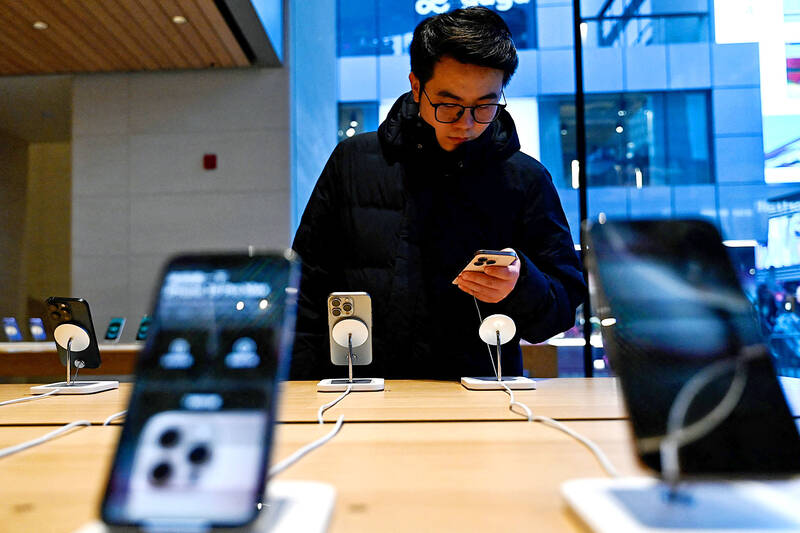Alibaba Group Holding (阿里巴巴) chairman Joe Tsai (蔡崇信) yesterday said that the company would partner with Apple Inc on artificial intelligence (AI) for iPhones sold in China, sending the Hong Kong-listed shares of the Chinese tech giant soaring over 9 percent to a three-year high.
“They talked to a number of companies in China. In the end they chose to do business with us. They want to use our AI to power their phones. We feel extremely honored to do business with a great company like Apple,” Tsai said at the World Governments Summit in Dubai.
The Hong Kong-listed shares of Alibaba jumped as much as 9.2 percent to HK$124.3, their highest since January 2022.

Photo: AFP
Apple has yet to provide its full suite of AI features in China because of regulations that require it to partner with a locally accredited company, Tsai said.
He said he expects that would be the case for the long term, but did not specify if Alibaba is or would be the exclusive AI provider for Apple in China.
Apple last year signed a landmark deal with OpenAI to integrate ChatGPT into iPhones internationally.
The AI integration comes at a critical time for Apple, which has faced declining iPhone sales in China amid growing competition from domestic rivals, particularly Huawei Technologies Co (華為).
Industry analysts have pointed to the absence of advanced AI features — a key selling point in latest-generation smartphones — as a significant disadvantage for Apple in the Chinese market.
Apple suffered a notable setback in China last year, losing its crown as the country’s leading smartphone vendor as annual shipments in China fell 17 percent, data from market research firm Canalys showed.
Vivo Communication Technology Co (維沃) captured the largest market share at 17 percent, while Huawei secured second place with 16 percent, pushing Apple to third place with 15 percent of the market, the data showed.
Alibaba has become a Chinese AI favorite among investors, with its stock price up over 40 percent so far this year.
The firm late last month released a new version of its Qwen 2.5 AI model, whose functionality it said surpassed that of DeepSeek-V3, which caused a stir earlier this year for its capability and low cost.
Meanwhile, Baidu Inc (百度) yesterday announced it was making its flagship AI chatbot free, making its own foray to grab a larger slice of the market.
Additional reporting by Bloomberg

Taiwan Semiconductor Manufacturing Co (TSMC, 台積電) last week recorded an increase in the number of shareholders to the highest in almost eight months, despite its share price falling 3.38 percent from the previous week, Taiwan Stock Exchange data released on Saturday showed. As of Friday, TSMC had 1.88 million shareholders, the most since the week of April 25 and an increase of 31,870 from the previous week, the data showed. The number of shareholders jumped despite a drop of NT$50 (US$1.59), or 3.38 percent, in TSMC’s share price from a week earlier to NT$1,430, as investors took profits from their earlier gains

In a high-security Shenzhen laboratory, Chinese scientists have built what Washington has spent years trying to prevent: a prototype of a machine capable of producing the cutting-edge semiconductor chips that power artificial intelligence (AI), smartphones and weapons central to Western military dominance, Reuters has learned. Completed early this year and undergoing testing, the prototype fills nearly an entire factory floor. It was built by a team of former engineers from Dutch semiconductor giant ASML who reverse-engineered the company’s extreme ultraviolet lithography (EUV) machines, according to two people with knowledge of the project. EUV machines sit at the heart of a technological Cold

TAIWAN VALUE CHAIN: Foxtron is to fully own Luxgen following the transaction and it plans to launch a new electric model, the Foxtron Bria, in Taiwan next year Yulon Motor Co (裕隆汽車) yesterday said that its board of directors approved the disposal of its electric vehicle (EV) unit, Luxgen Motor Co (納智捷汽車), to Foxtron Vehicle Technologies Co (鴻華先進) for NT$787.6 million (US$24.98 million). Foxtron, a half-half joint venture between Yulon affiliate Hua-Chuang Automobile Information Technical Center Co (華創車電) and Hon Hai Precision Industry Co (鴻海精密), expects to wrap up the deal in the first quarter of next year. Foxtron would fully own Luxgen following the transaction, including five car distributing companies, outlets and all employees. The deal is subject to the approval of the Fair Trade Commission, Foxtron said. “Foxtron will be

INFLATION CONSIDERATION: The BOJ governor said that it would ‘keep making appropriate decisions’ and would adjust depending on the economy and prices The Bank of Japan (BOJ) yesterday raised its benchmark interest rate to the highest in 30 years and said more increases are in the pipeline if conditions allow, in a sign of growing conviction that it can attain the stable inflation target it has pursued for more than a decade. Bank of Japan Governor Kazuo Ueda’s policy board increased the rate by 0.2 percentage points to 0.75 percent, in a unanimous decision, the bank said in a statement. The central bank cited the rising likelihood of its economic outlook being realized. The rate change was expected by all 50 economists surveyed by Bloomberg. The